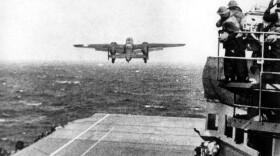
Noah Adams
Noah Adams, long-time co-host of NPR's All Things Considered, brings more than three decades of radio experience to his current job as a contributing correspondent for NPR's National Desk., focusing on the low-wage workforce, farm issues, and the Katrina aftermath. Now based in Ohio, he travels extensively for his reporting assignments, a position he's held since 2003.
Adams' career in radio began in 1962 at WIRO in Ironton, Ohio, across the river from his native Ashland, Kentucky. He was a "good music" DJ on the morning shift, and played rock and roll on Sandman's Serenade from 9 p.m. to midnight. Between shifts, he broadcasted everything from basketball games to sock hops. From 1963 to 1965, Adams was on the air from WCMI (Ashland), WSAZ (Huntington, W. Va.) and WCYB (Bristol, Va.).
After other radio work in Georgia and Kentucky, Adams left broadcasting and spent six years working at various jobs, including at a construction company, an automobile dealership and an advertising agency.
In 1971, Adam discovered public radio at WBKY, the University of Kentucky's station in Lexington. He began as a volunteer rock and roll announcer but soon became involved in other projects, including documentaries and a weekly bluegrass show. Three years later he joined the staff full-time as host of a morning news and music program.
Adams came to NPR in 1975 where he worked behind the scenes editing and writing for the next three years. He became co-host of the weekend edition of All Things Considered in 1978 and in September 1982, Adams was named weekday co-host, joining Susan Stamberg.
During 1988, Adams left NPR for one year to host Minnesota Public Radio's Good Evening, a weekly show that blended music with storytelling. He returned to All Things Considered in February 1989.
Over the years Adams has often reported from overseas: he covered the Christmas Eve uprising against the Ceasescu government in Romania, and his work from Serbia was honored by the Overseas Press Club in 1994. His writing and narration of the 1981 documentary "Father Cares: The Last of Jonestown," earned Adams a Prix Italia, the Alfred I. DuPont-Columbia University Award and the Major Armstrong Award.
A collection of Adams' essays from Good Evening, entitled Saint Croix Notes: River Morning, Radio Nights (W.W. Norton) was printed in 1990. Two years later, Adams' second book, Noah Adams on All Things Considered: A Radio Journal (W.W. Norton), was published. Piano Lessons: Music, Love and True Adventures (Delacore), Adams' next book, was finished in 1996, and Far Appalachia: Following the New River North in 2000. The Flyers: in Search of Wilbur and Orville Wright (Crown) was published in 2004, and Adams co-wrote This is NPR: The First Forty Years (Chronicle Books), published in 2010.
Adams lives in Yellow Springs, Ohio, where his wife, Neenah Ellis, is the general manager of NPR member station WYSO.
-
Midway University in Kentucky trains students in equine management, and the campus is surrounded by barns and paddocks.
-
At the Air Force museum in Dayton, technicians and volunteers are working to restore a unique piece of history. The B-17 bomber Memphis Belle is being carefully returned to its wartime appearance.
-
The Boeing 707 that carried assassinated President John F. Kennedy's body from Dallas to Washington, D.C., is center stage in a new $40 million hangar at the U.S. Air Force Museum in Dayton, Ohio.
-
Elizabeth Wiley, chef-owner of two top Dayton, Ohio, restaurants, goes off-menu to cook beer-braised turkey thighs in her home kitchen.
-
One night a week, Erin and Robert Lockridge serve homemade pizza out of an empty corner cafe in Cincinnati, and diners pay what they can. The couple sees their work as God's mission in the community.
-
Writer Julia Keller, who grew up in the state, says she surprised herself when she set her novels there. But riverbanks, convenience stores and abandoned coal mines make for perfect crime scenes.
-
One year ago the Michigan apple harvest, hurt by a winter warm-up and a late spring freeze, was almost nonexistent at 3 million bushels. This fall the crop is projected to yield a record-setting 30 million bushels.
-
Seventy years ago Wednesday, 80 Army Air Corps crewmen flew 16 B-25 bombers on a secret mission to Japan. The World War II attack became known as the Doolittle Raid, and this week, four of the five remaining Doolittle raiders will be gathering in Dayton, Ohio, to remember the mission.
-
"Art is about being provocative," says the award-winning poet. "Art is also about beauty and if you leave the latter out, the former doesn't matter."
-
It was 40 years ago Tuesday that the Kent State University shootings -- which killed four people and wounded nine others -- stunned the nation. For many there on May 4, 1970, it was a life-changing event. But students on the Kent campus today say it had little bearing on their choice of college.








